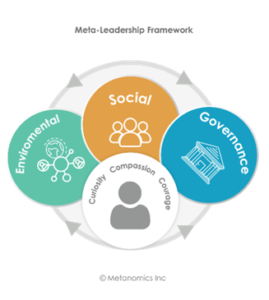
Meta-Leadership
Strategy & meta-Leadership Simulation for a Responsible World
Leadership is evolving. We no longer consider it as one individual with a strong, authoritarian personality. Instead, leadership encompasses the impact on teams, organizations, societies, and even humanity. Moreover, our leaders are moving from an individualistic to a collective mindset.
strong, authoritarian personality. Instead, leadership encompasses the impact on teams, organizations, societies, and even humanity. Moreover, our leaders are moving from an individualistic to a collective mindset.
Transformational leadership and vertical development develop more sophisticated ways of leading by encouraging wisdom that goes beyond the self. They push leaders beyond their own interests to inspire change in others. Nevertheless, these and similar theories have room to expand their focus to incorporate leaders’ potential contribution to global societal development and sustainable growth.
For example, deciding whether to source a product from the local market or import it from another country is no longer a financial decision. The leader must consider how this decision will impact the organization they represent, the well-being of the employees of their organization, the community that they live in, and the environment.
We, therefore, need a new kind of leadership theory that can meet the needs of today’s leaders – leaders who must master the collective mindset to thrive in an increasingly integrated world.
We need meta-leadership.
Meta-leadership is leading with purpose and values. It uses social behaviors, skills, and knowledge to produce and influence collective and responsible results that stem from responsible decision-making. A concept created by Metanomics Inc., meta-leadership is leading and making decisions while being conscious of their direct or indirect impact on people, systems, and the world.
Alongside these noble aims, we must also understand the importance of profitability and financial stability as drivers of sustainable humanity. Today, we can see the impact of a collective mindset on profitability and growth – the kind of mindset meta-leadership promotes.
A CDP survey of S&P 500 companies found that the better companies were at integrating climate change into risk management, reducing emissions, and prioritizing the long-term benefit of their shareholders, the more profitable they were. Return on equity was 18% higher for top-quartile performers. They also experienced lower earnings volatility and more substantial dividend growth.
Meanwhile, a Gartner study predicts that through 2022, 75% of companies with diverse and inclusive decision-making teams will exceed their financial targets. The study found that gender-diverse and inclusive teams outperformed their less inclusive counterparts by 50%. Companies with more diverse leadership teams also report higher innovation revenue – 45% of total revenue versus just 26%, according to a 2018 BCG report.
Providing more evidence that the principles of meta-leadership work, a 2019 study by the Diligent Institute found that the top fifth of performers on corporate governance in the S&P 500 index outperformed the bottom fifth by 15% over a two-year period.
Metanomics Inc. has created the Meta-Leadership Framework, represented visually in the above image. It includes the three elements of sustainable humanity (people, systems, and world) and also represented as an ESG leadership framework (environmental, social, and governance) along with the mindsets needed to become a meta-leader (curiosity, compassion, and courage).
Here is a description of the framework:
- Meta-leaders are at the center, where their decisions impact the world directly or indirectly. Therefore, making the right decisions on ESG will ripple outwards to those around them. To help them make purposeful, ESG-conscious decisions, leaders must have the 3C’s mindset (curiosity, compassion, and courage).
- Teams and units within an organization are also responsible for making ESG-conscious decisions that will impact the whole organization.
- This way, decisions flow through communities and out into the world (the gray ‘impact’ arrows).
- Yet, the ripple effect does not stop there! Decisions by others, and the world have a reverse impact on communities, organizations, teams, individuals, and future generations (that is why the arrows flow both ways).
- Leaders must make profitable, ESG-conscious decisions while leaving the world a better place for future generations.

Behind the meta-leader is the 3C’s mindset. It is the foundation of every decision:
- Curiosity – A curious leader is a creative leader who wants to learn and try new things, see new connections, and constantly strive to improve things for themselves and others. They ask questions and try to make sense of the world around them. They connect their decisions with the impact on people, communities, organizations, and the earth.
- Compassion – A compassionate leader is clear about how their organization makes the world a better place. They role model authenticity and respect in everything they say and do. However, they are not pushovers: they know caring for staff, customers, and the community takes strength.
- Courage – A courageous leader is decisive when doing the right thing. They are ambitious for their people, community, organization, and the world – undaunted by risks and obstacles. They can face hard facts, admit mistakes and flaws, and adopt a growth mindset to grow and improve.
Anyone can become a meta-leader and adopt the 3C’s mindset while remaining authentic. Caring for teams, communities, organizations, and the world requires curiosity, compassion, and courage. You may measure your 3C’s mindset by taking this 5-minute assessment: Meta-Leadership 3C’s Self Assessment.
Meta-leadership can transform people – but equally significantly, it can transform the world. Now more than ever, we need leaders equipped with a future-oriented mindset who look beyond the confines of traditional roles to connect with people, communities, and the environment around them. Transitioning from the individualistic to the collective creates virtuous circles of positive change and clearly increases performance and profits. Filled with curiosity, compassion, and courage, today’s meta-leaders will shape tomorrow’s world.
For meta-leadership training
